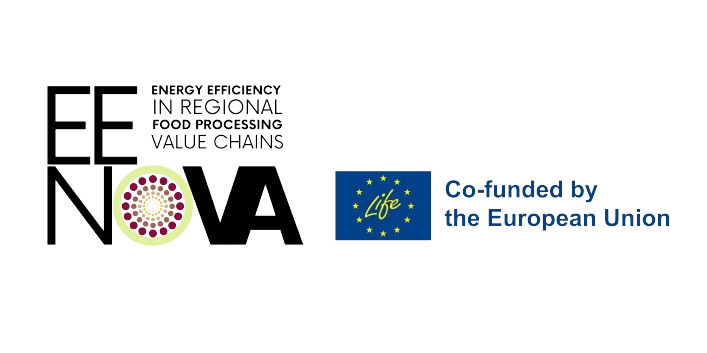ABOUT THE PROJECT
EENOVA PROJECT
In a nutshell.
Co-funded by the European Union’s LIFE Progamme, EENOVA aims to tackle some of the main challenges related to the food chain and its high dependence on fossil fuel, by putting an in-depth focus on energy-smart solutions, by assessing and increasing the level of energy efficiency, renewable energy while at the same time reducing the carbon intensity of 5 regional value chains in 5 different food processing subsectors, namely:
- Bakery/Upper Austria–Austria (AT)
- Meat/North-West Region–Romania (RO)
- Water and soft drinks South-east Lithuania (LT)
- Winery/Burgas Province-Bulgaria (BG)
- Dairy/West Slovenia (SI)

The key focus areas for EENOVA include:
Food Processing:
|
Logistics and Packaging:· International transport of imports· Transportation to manufacturers & distribution logistics· Smart food waste management· Sustainable packaging production & final product packaging |
Methodology - A Roadmap to a Sustainable Energy Future.
Through our series of roundtables, we bring together companies operating within the same value chain and their intermediaries, the Regional Hubs. These roundtables serve as collaborative platforms where expertise meets ambition.
Our first roundtable is all about understanding the current energy flows. We measure the status quo of existing regional value chains through ENERGY AUDITS. These audits can be either existing ones or new ones. We work closely with companies, acting as independent, with the goal to help these companies take actionable steps to achieve the best possible results for themselves and their regional value chain.
The second roundtable dives deeper into the results of the energy audits. We evaluate the feasibility of these results and identify critical factors affecting energy efficiency for the whole value chain. Together with the companies, we develop a company and value chain energy efficiency optimization plan. Our collaborative efforts are aimed at finding practical and effective solutions to enhance energy efficiency.
In our third roundtable, we bring together the insights gathered in the first two sessions and combine them with already set policy targets (e.g., energy efficiency by 2030, climate neutral by 2050..). This allows us to put everything into a broader policy perspective. The outcome is a first draft of policy recommendations from both the company and regional/national policy and authority perspectives. We involve the five regional hubs in this crucial step to ensure a well-rounded approach.
Our final roundtable aims to maximize the impact of EENOVA results. We use the lessons learned from previous sessions to adapt the value chain energy-saving model. We generate an externally validated scalable model that addresses the barriers to implementing energy efficiency and renewable energy sources in the business sector, particularly in SMEs and welcome interested companies from similar or different value chains to participate and kickstart replication.
Expected Impact
The EENOVA Project will have a transversal & powerful impact, namely through:
Significant energy savings within and after the event of the project in 5 different regional value chains.
Upskilled energy and non-energy experts in companies of the value chains in leveraging EE/RES implementation
EENOVA will formulate concrete recommendations, which will be externally validated to ensure their effectiveness, and will target a minimum regional hubs, encouraging the adoption of energy-efficient practices.
EENOVA will establish a sustainable strategy, complete with a replication model that can be readily applied in other agri-food value chains and beyond.
Underlying Principles
A Place-based Approach
EENOVA believes in the importance of regional contexts (e.g., starting point differs due to different regulation, in real life used technologies, availability of financial and technical resources) and their different solution approaches.
Builduing Trust
EENOVA believes in physical human interaction and trust, especially when it comes to uncomfortable decisions (e.g., the advantage for the whole value chain is bigger than the intra company advantage, larger investments must be taken)
Supporting Policy Goals
EENOVA supports various complex multidimensional policies of the Green Deal, such as the path towards climate neutrality, by indirectly helping to cut greenhouse gas emissions, the Farm to Fork Strategy, by integrating sustainability into corporate strategies or the REPowerEU, being the project totally aligned with the renewable energy actions and goals.










